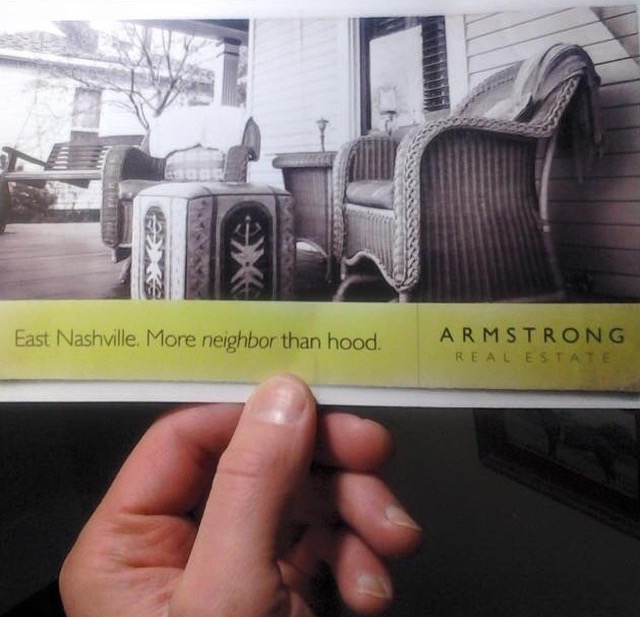Last week, a Nashville real estate company found themselves in hot water after sending out a controversial mailer.
It featured the line, “East Nashville. More neighbor than hood.”

Even if you don’t live in Nashville or know anything about the East Nashville community, you might be able to see how that line could be offensive or inappropriate.
As someone who lives here, I certainly understand the intent behind the postcard. However, it wasn’t the best way to convey their message of East Nashville being a neighborly community.
And, as you might guess, this postcard from Armstrong Real Estate Group definitely landed with mixed reviews.
Once these postcards started hitting mailboxes, people took to Facebook and Reddit to share their outrage. And the story spread like wildfire.
 It wasn’t long before the real estate company had a media firestorm on their hands. An article first appeared in the Nashville Scene and
It wasn’t long before the real estate company had a media firestorm on their hands. An article first appeared in the Nashville Scene and
the story made the rounds on the local TV stations
later that day.
Although this story escalated quickly, it didn’t last long. That’s because the company did a great job responding to the situation.
5 Steps to Responding to a PR Crisis
Whether or not you agree with this company’s advertising approach, I do applaud the company for how they responded. I think it offers a nice lesson for what to do should you find yourself in a public relations crisis.
Here are some key points for how to respond to a PR crisis should you find your company in a similar situation:
1. Respond quickly.
The first news outlet to share this story was the Nashville Scene. They published their article at 12:23 p.m. on Thursday. The paper posted an update to the article at 3:05 p.m. with a response from Aaron Armstrong, the company’s CEO. That’s a pretty quick turnaround time.
Had Armstrong let this story go a few more hours or even into the next day, this issue would have lasted much longer than 24 hours.
One of the most important things you can do in a crisis is acknowledge the issue quickly. The longer you take to respond, the longer you let others control the narrative. It also can seem that you are out of touch or hiding something. This is not something you want. You must acknowledge that you have an issue.
With social media and our 24/7 news cycles, speed is paramount. It’s important that you don’t let a crisis fester. If you do, the story just becomes that much bigger.
Armstrong did it right. Make your response quickly.
2. Own up to the mistake.
What really impressed me about this story is that Armstrong owned up to the mistake. Here is his full statement to the Nashville Scene:
“I guess the first thing I’ll say is that the interpretation that the community has taken to it was definitely different than how we saw it, and I’m not trying to make excuses, I’m not trying to convince you to believe me. I will tell you that I’m ashamed and I’m embarrassed and I feel really terrible.”
“When that slogan was pitched to us by the person that has done a lot of our marketing … I don’t know if you’ve seen any of our previous postcards or not, but one of our last ones was ‘Armstrong Real Estate: More real than estate.’ And maybe it’s our stupidity, but we saw that as a creative way to split up the word ‘neighborhood’ and play off of the bumper stickers that say ‘over the river and through the hood.’ And there’s a burrito at Nuevo Burrito that’s the ‘over the river and through the hood.’
“And we wanted to highlight East Nashville as a really neighborly community. I know that sounds stupid at this point, after seeing the response, and I’m not trying to make light of people’s response. Perception is reality, and if people feel that way, I feel awful. I’m trying to call back everybody who has called and tell you that was our thought.
“Had I thought about it or shown it to somebody else who had that interpretation, that line never would have made it off the paper. But it did, and the only thing I know to do is to apologize. It’s not what we stand for and it’s not our desire to offend anybody. It’s my business and I’m the one that’s responsible. And I screwed up and I’m sorry.”
Armstrong gave interviews to all the TV stations as well and echoed a similar response there.
Had Armstrong tried to make excuses, shift blame or talk his way out of it, the headlines and response would have been much more egregious. Instead, many of the headlines read “Real Estate Agent Apologizes for ‘Hood’ Ad”.
If you make a mistake, own it. It’s tough, but people respect you a whole lot more when you apologize — especially when you actually mean it.
3. Answer ALL reviews, emails and calls.
If you notice in Armstrong’s response, he said he has spent the past few days returning all the calls and emails he received.
That is a GREAT first step.
However, he should also take the time to do that on his Facebook page, Yelp, Reddit and other places where people have commented.
Is this daunting? Yes.
But, as Jay Baer recommends, hugging your haters can help turn biggest enemies into your greatest advocates. This is especially important for Armstrong as the people who are responding are likely those that received the postcard — his target audience.
Even though this story has been all over the news, you can’t assume that they’ve seen your public apology. If someone takes the time to post a review or leave a comment about the issue, they want to hear from YOU.
Make this a priority. How you respond to these negative reviews
can mean the difference between attracting a crop of new clients or building an army of enemies.
4. Fix the problem.
In this case, fixing the problem is fairly simple. The company is choosing to stop running the postcards.
Once the dust settles from your PR crisis, it’s important to go back and fix what was wrong. Oftentimes, a crisis occurs because there is something that is broken with your company — maybe it’s your internal processes or customer service.
Whatever the issue, it can hurt for it to be uncovered in such a public way, but it’s critical that you address the issue so you don’t encounter this problem again.
5. Go the extra mile.
This step isn’t always necessary, but it can help you build your credibility and begin to reshape perception of your company.
In this case, there are a few things that Armstrong Real Estate could do to help re-build their image:
- Get valuable feedback. As the company is talking to people who complained, they learn more about what people think about the East Nashville neighborhood. This could become a great focus group for creating better campaigns that better represent the perception of the people who actually live in the community.
- Give back to the neighborhood. Another option is to find ways to give back to the community. Perhaps Armstrong Real Estate could donate the cost of the postcards to a local non-profit or cause that is important to the East Nashville community. Or, they could find out ways they could serve the neighborhood while taking to those that complained. Maybe there are ways the real estate company could help further improve the community.
- Be neighborly. If Armstrong Real Estate wants to communicate that East Nashville is a neighborly community, they could do something to help reinforce this idea. Maybe it means hosting a neighborhood BBQ or simply going around to meet people in the community.
Preventing a PR Crisis
The best way to respond to a crisis is to prevent it in the first place. And this one clearly could have been prevented.
Armstrong readily admits that they should have gotten feedback on the postcard before running the campaign. Had they done that, the postcard wouldn’t have been printed and this wouldn’t have become a media firestorm.
However, it’s rare that you find a PR crisis that’s handled so well. Despite the poorly chosen marketing campaign, the company handled the media firestorm with grace.
If you should find yourself in this situation (and I hope you don’t!), follow these steps and remember this story to respond to a PR crisis in the right way.
What do you think about how the company responded? How would you have handled it?
Postcard Image credit: patrick_mc on Reddit



2 replies on “How to Respond to a PR Crisis: What to Do When Marketing Goes Way Wrong”
Definitely an interesting case study right here at home! I totally agree that Armstrong should have sought feedback on their postcard. That’s why diverse workplaces are so important and valuable!
It’s been shown that more diverse companies are equipped to make more thoughtful decisions. If Armstrong wants to serve East Nashville, do their own teams reflect that community, or at the very least, actively seek to understand them? I can’t answer that, of course, but it’s a question worth asking when you look at what happened here. Examining that as a part of Steps 4 & 5 could be a really enlightening and productive result of this PR crisis. Reaching out to the community they want to work with won’t just help them rebuild their image. It can also help them be a better company from the inside out!
Super points, Danielle. I almost included an additional section about how to prevent marketing mess ups in the first place and your points definitely hit on that. Maybe this is even another blog post! But, you’re absolutely right – it’s important to get feedback and understand your target audience. And in this case, while some found it funny or clever, a good number of people were offended. Taking the time to communicate with your audience – and even getting their feedback – is critical and valuable.